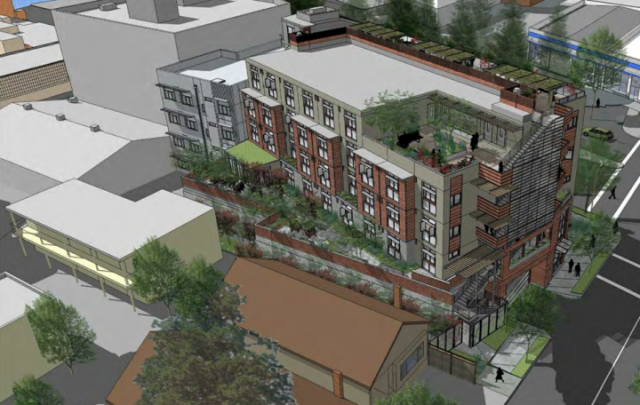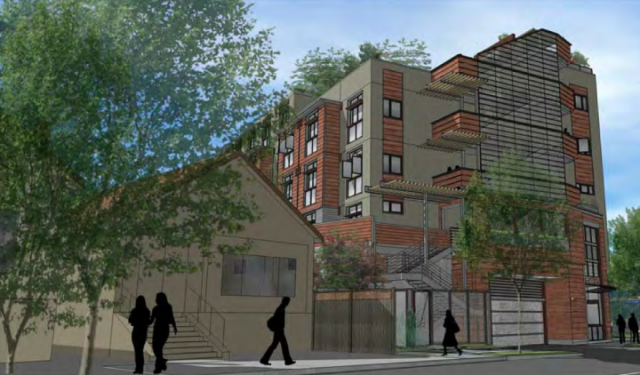“I’m astonished at how fully the applicant has ignored our very clear suggestions. Very clear,” Commissioner Shoshana O’Keefe said. “From staff, from us. I was at the last meeting, I know what was said. I can’t believe you would come up here with a straight face and say you were confused as to what we were asking for.”
Added Commissioner Deborah Matthews: “One of the things that really hit a dissonant, not very friendly note for me was that we did give direction to the applicant about what we wanted to see,” she said. “We worked really hard and stayed very late to make sure that we provided a direction that was really good and sound so that you had the tools to work with, and I felt like we were ignored.”
Last week, Axis presented a plan that removed three units from the top floor, increased the setback at the northeast corner, and enlarged a community room to include space for a dining area and a gym. Axis reps told commissioners that they would be willing to remove another three units from the project’s fourth floor if they would be allowed to drop eight parking “pits” from a garage currently set to include room for 32 vehicles.
Had it been approved, the project would have been the highest density, largest micro-unit project in the country, said Commissioner Prakash Pinto, with roughly 243 dwelling units to the acre. Pinto noted that, for comparison, Acheson Commons, which is slated to be built in the heart of downtown Berkeley, within sight of BART, will have less than 200 dwelling units per acre. He said it’s not density that’s the problem, but the degree of density and where it’s located.

Supporters of the project, five of whom spoke during public comment period, said it would bring a much-needed transit-oriented, environmentally conscious housing option to Berkeley.
Zoning board members and other members of the public who spoke against the project — more than 20 of them — said they too believe in those philosophies, but ultimately found the plans for 2701 Shattuck to be too much density in the wrong place.
“There isn’t a single one of us that doesn’t believe in walkable, bikeable, safe communities, but context matters a lot,” said Commissioner Igor Tregub. “This is the most opposition I have seen for any project that has been before us. It’s also the first time that I’ve seen staff recommend a denial.”
Neighbors who spoke in opposition to the project said the developer had failed to listen to their concerns or suggestions — or those from the zoning board or city staff — or compromise in any significant way. Some said a “high-end restaurant” with valet parking wouldn’t be a good fit in the neighborhood. Others said, as commissioners also noted, that the project was too dense for the location.
“We favor smart growth, but not all growth is smart growth,” said Berkeley resident Ellen Langer. “Some growth is cancerous growth. Some growth diminishes the quality of the life of all surrounding tissue. That’s what this would do. And it would do terrible things to the people who live in it.”
 Louise Rosencrantz noted the neighborhood’s history of supporting past development projects such as Berkeley Bowl, the opening of Any Mountain, and businesses like Reel Video, which is now DaVita dialysis center. And she said many neighbors really would like to see a smaller development on the site.
Louise Rosencrantz noted the neighborhood’s history of supporting past development projects such as Berkeley Bowl, the opening of Any Mountain, and businesses like Reel Video, which is now DaVita dialysis center. And she said many neighbors really would like to see a smaller development on the site.
“We have tried to work cooperatively with the developer, but very little has changed,” she said. “We still have a project that is too dense, too high, and incompatible with the neighborhood. We want to move forward and work on an appropriate development for this site. Our neighborhood has shown that we know how to do this. All we need is a cooperative partner.”
The size of the units themselves was much less of an issue Thursday night than the overall size and density of the proposed building. Some commissioners said the apartments should simply be called studios, and noted that they had lived in similarly-sized units themselves when they were younger.
“I lived in apartments that big way after college for a long time,” said Commissioner Steven Donaldson. “I think we have to look at the positive aspects [of the project] for the environment. We do have to take into account more density near transit.… There’s a lifestyle of people who will look at that and like to live that way.”
Three commissioners — Donaldson, Bob Allen and David Stoloff (who was sitting in for George Williams) — voted to approve the project if the applicant would remove an additional three units on the fourth floor, a suggestion made by staff. But the rest of the board voted against that proposal.
“Berkeley is a dynamic city. It’s growing, it’s changing,” observed Stoloff. “We don’t want to, nor can we, make it stay still.”
Ultimately, Commissioner Sophie Hahn moved to deny the 2701 Shattuck application. Her motion carried, with Donaldson, Allen and Stoloff voting against it, and the rest of the board in support.
Muhammad Nadhiri, managing partner at Axis Development Group, declined to comment this week on whether Axis plans to appeal the decision or what he made of the zoning board’s decision.

